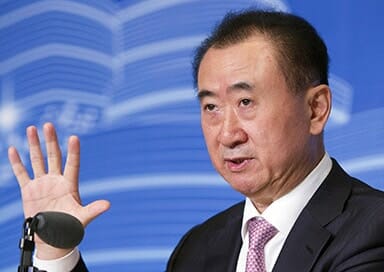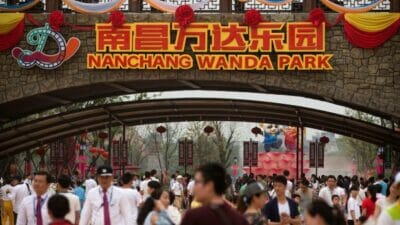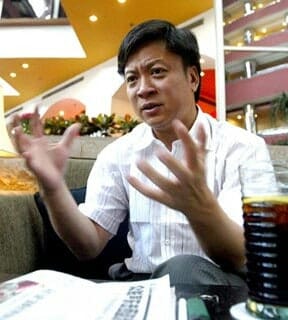
Wanda’s Wang Jianlin is letting go of an expensive theme park business
Less than one year ago, Wang Jianlin’s Wanda Group paid $4.4 billion to privatise its Hong Kong-listed developer, Wanda Commercial Properties, in the biggest share buy-back ever on the city’s stock exchange.
While the billionaire property developer still hopes to achieve a mainland listing for his empire of malls, hotels and theme parks, the price of gaining access to a stock market in Shanghai or Shenzhen might be a record RMB 63.18 billion ($9.3 billion) asset sale, which the company announced on its website yesterday.
Under the terms of the announced deal, Wanda is selling a 91 percent stake in its 13 “Cultural Tourism City” theme park projects, along with 76 hotels, to Tianjin-based builder Sunac, in what appears to be China’s largest ever real estate transaction.
Wanda Pays Off Debt With Mainland Listing as a Goal
Wang Jianlin, celebrity chairman of the Beijing-based firm, told news agency Caixin that Wanda will use the proceeds from the deal to reimburse most of the company’s bank loans. Dalian Wanda Commercial Properties’ total debts stood at RMB 222 billion at the end of 2015, when the company issued its most recent annual report.
The deal may improve the group’s chances of relisting its main property business on a mainland stock exchange, after the subsidiary was delisted from the Hong Kong exchange last September. Wanda, along with fellow deal-makers HNA and Fosun, was among companies targetted for scrutiny over their debts last month when the China Banking Regulatory Commission (CBRC) asked financial institutions to review borrowings by some of the mainland’s biggest conglomerates.
Even after the developer de-listed last year, ratings agencies had downgraded its credit, with Standard & Poor’s marking down the commercial developer to BB+ at the same time that it also downgraded the parent conglomerate, Wanda Group. In its review of Wanda’s credit last December, S&P’s had specifically cited the developer’s slow progress in selling off assets as a reason for skepticism regarding its financial health.
When Wanda privatised its commercial property unit, it guaranteed investors in the buyout plan that it would achieve a mainland listing within two years. However, the company has thus far been frustrated in its efforts to achieve either an IPO or a backdoor listing.
Wanda Makes an Abrupt Exit from Theme Parks

Nanchang Wanda Park is among the projects being sold to Sunac
Through the deal, Wanda is offloading a RMB 29.6 billion ($4.3 billion) portfolio of tourism projects that typically combine a theme park with retail, hotel and residential elements. Wanda says it will continue to manage and operate the 13 tourism projects, which will retain the Wanda brand name.
The size of the deal surpasses China Vanke’s successful bid announced at the end of last month to acquire a package of development sites in Guangzhou for RMB 55.1 billion ($8.13 billion).
Among the properties being sold to Sunac is the $6 billion Harbin Wanda City complex, featuring the world’s biggest indoor ski slope, that opened for business just over a week ago. Wanda had some $47 billion in theme park projects in the pipeline as of last November.
Also included in the package deal is Nanchang Wanda City, a $3.2 billion project that opened in the capital of Jiangxi province last year. Wang unveiled the 200-hectare destination two weeks before Disney opened its landmark Shanghai Disney Resort. At the time, Wang vowed that his planned chain of 20 tourist complexes across China would crush Disney’s ambitions in the mainland.
Wanda has two other existing tourism parks, in Xishuangbanna in Yunnan province and Hefei in Anhui province. The company’s Wuhan Wanda Movie Park, which opened in 2014, was abruptly shuttered for renovations just nineteen months later amid reports of dwindling visitor numbers.
The deal with Sunac also includes planned projects in the lower-tier markets of Wuxi, Qingdao, Chengdu, Chongqing, Guilin, Jinan, Kunming, and Haikou, in addition to the first-tier city of Guangzhou.
Besides the tourism projects, Wanda is selling 76 of its 102 hotels in China to Sunac for RMB 33.6 billion ($4.9 billion). The portfolio comprises a mix of internationally branded hotels, including Hilton, Weston and Sofitel properties, as well as hotels managed under the developer’s Wanda Realm and Wanda Reign brands.
Fast-Growing Sunac Gets a New Horde of Property Assets

Sunac’s Sun Hongbin is reaching into the hotel business
For Sunac, the developer controlled by tycoon Sun Hongbin, the deal continues an acquisition spree that has seen the company snap up billions of dollars worth of properties and distressed assets in recent years.
The Tianjin-based homebuilder, which last year rode its string of acquisitions to become the mainland’s seventh-largest developer, told the media it would use only “existing capital,” presumably including loans against the company’s current assets of RMB 90 billion ($13.2 billion), to complete the deal.
Last September Sunac snapped up 18 million square metres of industrial projects from tech firm Legend Holdings for $2.1 billion. Just one month prior to that, Sunac spent RMB 4.4 billion ($663 million) to acquire commercial and residential projects in six Chinese cities from Hong Kong-based rival Top Spring International Holdings.
Sunac also made headlines in January this year when it agreed to buy minority stakes in two subsidiaries of flailing China tech firm LeEco for a combined $2.2 billion. Sunac chairman Sun Hongbin was named to LeEco’s board earlier this month.
Leave a Reply